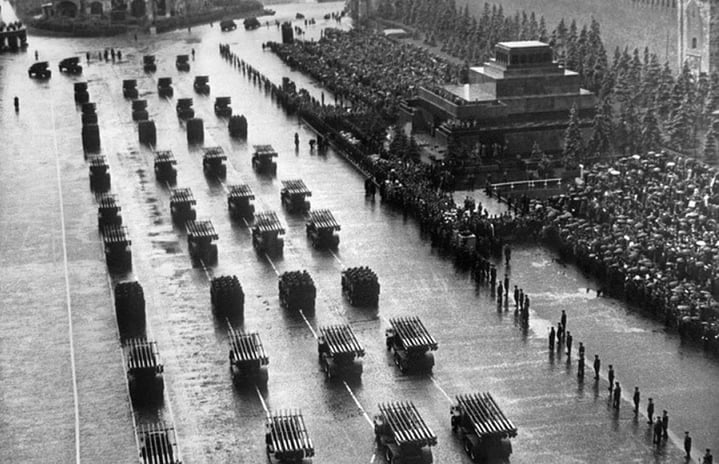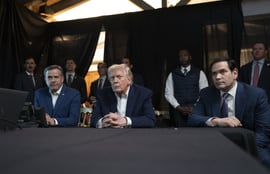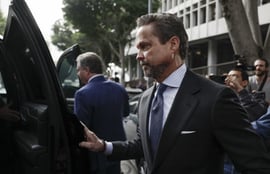Exactly 75 years have passed since the end of the Great Patriotic War. Several generations have grown up over the years. The political map of the planet has changed. The Soviet Union that claimed an epic, crushing victory over Nazism and saved the entire world is gone. Besides, the events of that war have long become a distant memory, even for its participants. So why does Russia celebrate the 9th of May as the biggest holiday? Why does life almost come to a halt on June 22? And why does one feel a lump rise in their throat?
For my parents, the war meant the terrible ordeals of the Siege of Leningrad where my two-year-old brother Vitya died. It was the place where my mother miraculously managed to survive. My father, despite being exempt from active duty, volunteered to defend his hometown. He made the same decision as millions of Soviet citizens. He fought at the Nevsky Pyatachok bridgehead and was severely wounded. This is the reason why I treasure in my heart the conversations I had with my father and mother on this subject.
People of my age and I believe it is important that our children, grandchildren and great-grandchildren understand the torment and hardships their ancestors had to endure. They need to understand how their ancestors managed to persevere and win. What they shared was the love for their homeland, their Motherland. That deep-seated, intimate feeling is fully reflected in the very essence of our nation and became one of the decisive factors in its heroic, sacrificial fight against the Nazis.
Nowadays, we have new traditions created by the people, such as the Immortal Regiment. This is the memory march that symbolises our gratitude, as well as the living connection and the blood ties between generations. Millions of people come out to the streets carrying the photographs of their relatives who defended their
Fatherland and defeated the Nazis. This means that their lives, the ordeals and sacrifices they endured, as well as the Victory that they passed to us will never be forgotten.
We have a responsibility to our past and our future to do our utmost to prevent those horrible tragedies from happening ever again. Hence, I was compelled to come out with an article about World War II and the Great Patriotic War.
One of the major outcomes of World War I was the establishment of the League of Nations. There were high expectations for that international organisation to ensure lasting peace and collective security. It was a progressive idea that, if followed through consistently, could actually prevent the horrors of a global war from happening again.
However, the League of Nations dominated by the victorious powers of France and the United Kingdom proved ineffective and just got swamped by pointless discussions. The League of Nations failed to prevent conflicts in various parts of the world, In case of the Munich Betrayal that, in addition to Hitler and Mussolini, involved British and French leaders, Czechoslovakia was taken apart with the full approval of the League of Nations.
The partition of Czechoslovakia was brutal and cynical. Munich destroyed even the formal, fragile guarantees that remained on the continent. It showed that mutual agreements were worthless. It was the Munich Betrayal that served as the “trigger” and made the great war in Europe inevitable.
Today, European politicians, and Polish leaders in particular, wish to sweep the Munich Betrayal under the carpet. Why? The fact that their countries once broke their commitments and supported the Munich Betrayal, with some of them even participating in divvying up the take, is not the only reason. Another is that it is kind of embarrassing to recall that during those dramatic days of 1938, the Soviet Union was the only one to stand up for Czechoslovakia.
Britain, as well as France, which was at the time the main ally of the Czechs and Slovaks, chose to withdraw their guarantees and abandon this Eastern European country to its fate. In so doing, they sought to direct the attention of the Nazis eastward so that Germany and the Soviet Union would inevitably clash and bleed each other white.
The Munich Betrayal showed to the Soviet Union that the Western countries would deal with security issues without taking its interests into account. In fact, they could even create an anti-Soviet front, if needed.
Nevertheless, the Soviet Union did its utmost to use every chance to create an Anti-Hitler coalition. Poland played its role in the failure of those negotiations as it did not want to have any obligations to the Soviet side.
In these circumstances, the Soviet Union signed the Non-Aggression Pact with Germany. It was practically the last among the European countries to do so. Besides, it was done in the face of a real threat of war on two fronts – with Germany in the west and with Japan in the east, where intense fighting on the Khalkhin Gol River was already underway.
Nowadays, we hear lots of speculations and accusations against modern Russia in connection with the Non-Aggression Pact signed back then. Yes, Russia is the legal successor state to the USSR, and the Soviet period – with all its triumphs and tragedies – is an inalienable part of our thousand-year-long history. However, let me also remind you that the Soviet Union gave a legal and moral assessment of the so-called Molotov–Ribbentrop Pact. The Supreme Soviet in its resolution of December 24, 1989 officially denounced the secret protocols as “an act of personal power” which in no way reflected “the will of the Soviet people who bear no responsibility for this collusion".
The German offensive was mounted in full accordance with the blitzkrieg doctrine. By September 17, the military and political leaders of Poland had fled to Romania, betraying its people, who continued to fight against the invaders. Poland's hope for help from its Western allies was vain.
Very few know that, immediately after the attack on Poland, in the early days of September 1939, Berlin strongly and repeatedly called on Moscow to join the military action. However, the Soviet leadership ignored those calls and planned to avoid engaging in the dramatic developments as long as possible. It was only when
it became absolutely clear that Great Britain and France were not going to help their ally and the Wehrmacht could swiftly occupy entire Poland and thus appear on the approaches to Minsk that the Soviet Union decided to send in, on the morning of September 17, Red Army units into the so-called Eastern Borderlines (Kresy), which nowadays form part of the territories of Belorussia, Ukraine and Lithuania.
Obviously, there was no alternative. Otherwise, the USSR would face seriously increased risks because the old Soviet-Polish border ran only within a few tens of kilometres from Minsk. The country would have to enter the inevitable war with the Nazis from very disadvantageous strategic positions, while millions of people of different nationalities, including the Jews living near Brest and Grodno, Przemyśl, Lvov and Wilno, would be left to die at the hands of the Nazis and their local accomplices – anti-Semites and radical nationalists.
World War II did not happen overnight, nor did it start unexpectedly or all of a sudden. And German aggression against Poland was not out of nowhere. It was the result of a number of tendencies and factors in the world politics of that time. All pre-war events fell into place to form one fatal chain. But, undoubtedly, the main factors that predetermined the greatest tragedy in the history of mankind were state egoism, cowardice, appeasement of the aggressor who was gaining strength, and unwillingness of political elites to search for compromise.
Therefore, it is unfair to claim that the two-day visit to Moscow of Nazi Foreign Minister J. Ribbentrop was the main reason for the start of World War II. All the leading countries are to a certain extent responsible for its outbreak. Each of them made fatal mistakes, arrogantly believing that they could outsmart others, secure unilateral advantages for themselves or stay away from the impending global catastrophe. And this short-sightedness, the refusal to create a collective security system cost millions of lives and tremendous losses.
I have always encouraged my colleagues to build a calm, open and trust-based dialogue, to look at the common past in a self-critical and unbiased manner.
However, many of our partners are not yet ready for joint work. On the contrary, pursuing their goals, they increase the number and the scope of information attacks against our country, trying to make us provide excuses and feel guilty. They adopt thoroughly hypocritical and politically motivated declarations. Thus, for example,
the resolution on the Importance of European Remembrance for the Future of Europe approved by the European Parliament on September 19, 2019 directly accused the USSR – along with the Nazi Germany – of unleashing the Second World War. Needless to say, there is no mention of Munich in it whatsoever.
I believe that such ‘paperwork’ which is clearly intended to provoke a scandal, is fraught with real and dangerous threats. It revealed a deliberate policy aimed at destroying the post-war world order whose creation was a matter of honour and responsibility for the countries a number of representatives of which voted today in favour of this deceitful resolution. Thus, they challenged the conclusions of the Nuremberg Tribunal and the efforts of the international community to create after the victorious 1945 universal international institutions.
Apart from posing a threat to the fundamental principles of the world order, this also raises certain moral and ethical issues. Desecrating and insulting the memory is mean. Meanness can be deliberate, hypocritical and pretty much intentional as in the situation when declarations commemorating the 75th anniversary of the end of World War II mention all participants in the Anti-Hitler coalition except for the Soviet Union. Meanness can be cowardly as in the situation when monuments erected in honour of those who fought against Nazism are demolished and these shameful acts are justified by the false slogans of the fight against an unwelcome ideology and alleged occupation. Meanness can also be bloody as in the situation when those who come out against neo-Nazis and Bandera's successors are killed and burned. Once again, meanness can have different manifestations, but this does not make it less disgusting.
Neglecting the lessons of history inevitably leads to a harsh payback. We will firmly uphold the truth based on documented historical facts. We will continue to be honest and impartial about the events of World War II.
The Nazi attack was truly unprecedented in terms of its destructive power. On June 22, 1941, the Soviet Union faced the strongest, most mobilised and skilled army in the world with the industrial, economic and military potential of almost all Europe working for it. Not only the Wehrmacht, but also Germany’s satellites, military contingents of many other states of the European continent, took part in this deadly invasion.
The most serious military defeats in 1941 brought the country to the brink of catastrophe. Combat power and control had to be restored by extreme means, nation-wide mobilisation and intensification of all efforts of the state and the people. Within eighteen months, the Soviet people did something that seemed impossible. Both on the front lines and the home front. It is still hard to realise, understand and imagine what incredible efforts, courage, dedication these greatest achievements were worth.
From the very first days, it was clear that the Nazi plan had failed. The Brest Fortress was protected to the last drop of blood by its defenders representing more than 30 ethnicities. Throughout the war – both in large-scale decisive battles and in the protection of every foothold, every metre of native land – we see examples of such unity.
The Soviet Union and the Red Army, no matter what anyone is trying to prove today, made the main and crucial contribution to the defeat of Nazism. These were heroes who fought to the end surrounded by the enemy at Bialystok and Mogilev, Uman and Kiev, Vyazma and Kharkov. They launched attacks near Moscow and Stalingrad, Sevastopol and Odessa, Kursk and Smolensk. They liberated Warsaw, Belgrade, Vienna and Prague. They stormed Koenigsberg and Berlin.
Almost 27 million Soviet citizens lost their lives on the fronts, in German prisons, starved to death and were bombed, died in ghettos and furnaces of the Nazi death camps. The USSR lost one in seven of its citizens, the UK lost one in 127, and the USA lost one in 320.
The efforts of all countries and peoples who fought against a common enemy resulted in victory. The British army protected its homeland from invasion, fought the Nazis and their satellites in the Mediterranean and North Africa. American and British troops liberated Italy and opened the Second Front. The US dealt powerful and crushing strikes against the aggressor in the Pacific Ocean. We remember the tremendous sacrifices made by the Chinese people and their great role in defeating Japanese militarists. Let us not forget the fighters of Fighting France, who did not fall for the shameful capitulation and continued to fight against the Nazis.
We will also always be grateful for the assistance rendered by the Allies in providing the Red Army with munition, raw materials, food and equipment. And that help was significant – about 7 percent of the total military production of the Soviet Union.
Today there can be no excuse for the criminal acts of Nazi collaborators, there is no period of limitations for them. It is therefore bewildering that in certain countries those who are smirched with cooperation with the Nazis are suddenly equated with World War II veterans. I believe that it is unacceptable to equate liberators with occupants. And I can only regard the glorification of Nazi collaborators as a betrayal of the ideals that united peoples in the fight against Nazism.
Historical revisionism, the manifestations of which we now observe in the West, primarily with regard to the subject of the Second World War and its outcome, is dangerous because it grossly and cynically distorts the understanding of the principles of peaceful development laid down at the Yalta and San Francisco conferences in 1945.
The creation of the modern system of international relations is one of the major outcomes of World War II. Even the most insurmountable contradictions do not prevent us from finding forms of peaceful coexistence and interaction if there is the desire and will to do so. Today the world is going through quite a turbulent time. Everything is changing, from the global balance of power and influence to the social, economic and technological foundations of societies, nations and even continents. In the past epochs, shifts of such magnitude have almost never happened without major military conflicts. Without a power struggle to build a new global hierarchy. Thanks to the wisdom and farsightedness of the political figures of the Allied Powers, it was possible to create a system that has restrained from extreme manifestations of such objective competition, historically inherent in world development.
It is a duty of ours to guarantee that this system is maintained and improved. Today, as in 1945, it is important to demonstrate political will and discuss the future together. Our colleagues – Mr Xi Jinping, Mr Macron, Mr Trump and Mr Johnson – supported the Russian initiative to hold a meeting of the leaders of the five nuclear-weapon states, permanent members of the Security Council.
What is our vision of the agenda for the upcoming summit? First of all, in our opinion, it would be useful to discuss steps to develop collective principles in world affairs. To speak frankly about the issues of preserving peace, strengthening global and regional security, strategic arms control, about joint efforts in countering terrorism, extremism and other major challenges and threats.
A special item on the agenda of the meeting is the situation in the global economy. And above all, overcoming the economic crisis caused by the coronavirus pandemic. Our countries are taking unprecedented measures to protect the health and lives of people and to support citizens who have found themselves in difficult living situations. Our ability to work together and in concert, as real partners, will show how severe the impact of the pandemic will be, and how quickly the global economy will emerge from the recession. Moreover, it is unacceptable to turn the economy into an instrument of pressure and confrontation. Popular issues include environmental protection and combating climate change, as well as ensuring the security of the global information space.
The agenda proposed by Russia for the upcoming summit of the Five is extremely important and relevant both for our countries and for the entire world. And we have specific ideas and initiatives on all the items.
There can be no doubt that the summit of Russia, China, France, the United States, and the UK will play an important role in finding common answers to modern challenges and threats, and will demonstrate a common commitment to the spirit of alliance, to those high humanist ideals and values for which our fathers and grandfathers fought shoulder to shoulder.
Drawing on a shared historical memory, we can trust each other and must do so. That will serve as a solid basis for successful negotiations and concerted action for the sake of enhancing the stability and security on the planet, for the sake of prosperity and well-being of all states. Without exaggeration, it is our common duty and responsibility towards the entire world, towards the present and future generations.
Read the full article:




